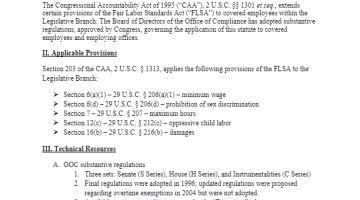I. Introduction
The Congressional Accountability Act of 1995 (“CAA”), 2 U.S.C. §§ 1301 et seq., extends certain provisions of the Fair Labor Standards Act (“FLSA”) to covered employees within the Legislative Branch. The Board of Directors of the Office of Compliance has adopted substantive regulations, approved by Congress, governing the application of this statute to covered employees and employing offices.
II. Applicable Provisions
Section 203 of the CAA, 2 U.S.C. § 1313, applies the following provisions of the FLSA to the Legislative Branch:
- Section 6(a)(1) – 29 U.S.C. § 206(a)(1) – minimum wage
- Section 6(d) – 29 U.S.C. § 206(d) – prohibition of sex discrimination
- Section 7 – 29 U.S.C. § 207 – maximum hours
- Section 12(c) – 29 U.S.C. § 212(c) – oppressive child labor
- Section 16(b) – 29 U.S.C. § 216(b) – damages
III. Technical Resources
A. OOC substantive regulations
- Three sets: Senate (S Series), House (H Series), and Instrumentalities (C Series)
- Final regulations were adopted in 1996; updated regulations were proposed regarding overtime exemptions in 2004 but were not adopted.
- Available at www.compliance.gov under the “Directives” tab
B. Department of Labor interpretations
- Although they do not have the force of law, DOL interpretations of the FLSA provisions are highly relevant and constitute an important source of information and guidance. However, to the extent that the DOL regulations have been revised since 1996, interpretations based on later versions that differ from those in existence at the time the OOC regulations were adopted would not apply.
- “We consider that the rulings, interpretations and opinions of the Administrator under this Act, while not controlling upon the courts by reason of their authority, do constitute a body of experience and informed judgment to which courts and litigants may properly resort for guidance. The weight of such a judgment in a particular case will depend upon the thoroughness evident in its consideration, the validity of its reasoning, its consistency with earlier and later pronouncements, and all those factors which give it power to persuade, if lacking power to control.” Skidmore v. Swift & Co., 323 U.S. 134, 140 (1944). See OOC substantive regulations at S501.105, H501.105, C501.105.

